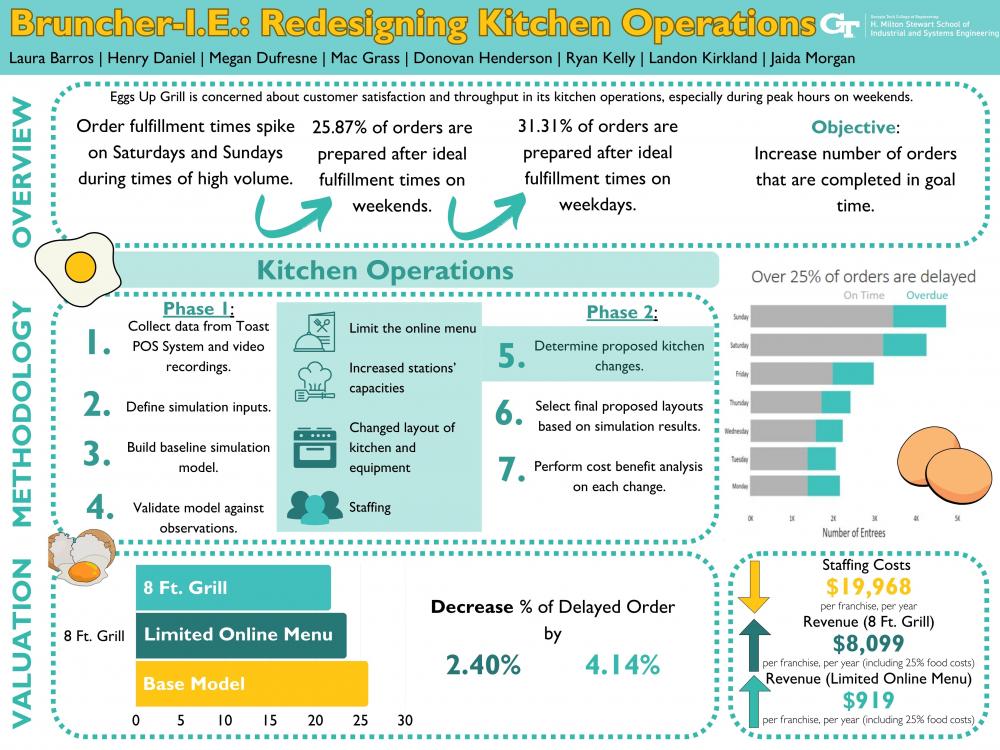Client Context
Eggs Up Grill is a brunch franchise focused on creating a warm and welcoming customer experience with 67 locations open. Founded in 1997 in Spartanburg, SC, Eggs Up Grill is, rapidly expanding with 104 locations in development or committed to opening. The average annual unit volume (AUV) for 2022 was approximately $1.149 million per location with the top 50% of stores averaging $1.375 million in sales.
Eggs Up Grill #71, located in Morrow, GA, is a recently opened location equipped with all the features that will be integrated into future restaurants. This location is a primary reference for the project. This project is supported by this location’s franchisees, their restaurant consultant, and the CFO at the corporate level.
At the level of an individual location, the franchisees are small business owners who buy into the franchise and pay a percentage of their revenue back to Eggs Up. Each year, the franchisees set personal goals with the corporate team for the revenue that they aim to make. To successfully meet these financial goals, a franchisee is given support from the beginning through being paired with a realtor, a contractor, a designer, a restaurant consultant, an operations lead, and a development coordinator. The process for opening a new location is standardized and operates well, but there are opportunities for franchisees to make decisions about their kitchen layout and kitchen processes.
Project Objective
To “sell smiles” and keep the customer happy, Eggs Up Grill should consistently get food to the customers in a timely manner. The goal is to have food on the table no longer than 12 minutes after being ordered on the weekdays and 15 minutes after being ordered on the weekends. On average, across all locations, it takes 11.24 minutes per order with 31.31% of orders coming out after the 12-minute goal on weekdays. On weekends the average is 12.71 minutes while 25.87% of orders come out after the 15-minute goal.
Sunday from 10am to 12pm is when demand is the highest. During this period, the average fulfillment time for an order is 13.59 minutes. The percentage of orders that are delayed is 33.60%.
Due to the rapid expansion planned, there is an opportunity to make changes to the kitchen at new locations.
Design Strategy
Each of the following steps will be explored further in the methodology and deliverables sections. First, we designed an alternative layout to reduce the number of overlapping paths in the kitchen. Next, we simulated the kitchen as is. The model was verified by comparing the simulation results to the actual fulfillment time data found during time studies at the Morrow location. Finally, we implemented changes to the current and alternative layouts to determine the output after increasing the capacity of the bottleneck stations, limiting the online menu, and changing the number of workers. Each change is accompanied by the cost-benefit analysis which enables Eggs Up Grill to determine the best layout for a new location.
Deliverables
Change the physical kitchen layout: The current physical layout is congested, and it is difficult for the cooks to move through the kitchen. The number of overlapping paths in the kitchen causes delays. Changing the physical layout can minimize overlapping paths and reduce workers' travel distance away from their station to avoid wasted time and motion.
Reassign capacity and space utilization of stations: If the capacity is increased at bottleneck stations, fulfillment times can decrease during peak hours.
Reassign cooks based on stations’ demands: During peak hours, 6 cooks are in the kitchen. This number of cooks increases congestion and overlapping flows in the kitchen.
Limit online menu: The current menu is just the in-store menu but virtual, with no changes that relate to how the orders affect the kitchen. To decrease fulfillment times, remove items with low (but not negligible) order counts that have high fulfillment times from the online menu.
The deliverables are redesigned layouts and a breakdown of the cost and benefit of each opportunity for the corporation to implement.
Value and Impact
The simulation results showed that it was possible to decrease the percentage of orders that were fulfilled after the 15-minute goal on Sundays, their busiest day, by 16% (25.87 to 21.73).
Each change had its own monetary value.
Increasing grill capacity: $126,338.16/year at the corporate level
Reassigning cooks: $4,912,128/year across all franchises
Reducing the online menu: $918.75/ year per franchise


